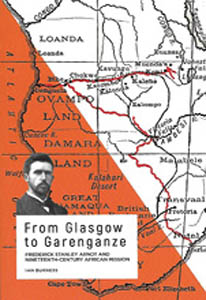
Paperback, 339 pages, Published by OPAL Trust and Echoes International, 1 Glenannan Park, Lockerbie, DG11 2FA, UK. ISBN 978-1-907098-32-1.
A debt of gratitude is owed to the writer for the very readable style in which he has written this book. His extensive and detailed research is reflected in the large number of reference documents identified in the bibliography. For the reader, however, the events described are captivating, with or without any knowledge of F. S. Arnot, or the evolution of nineteenth century African Mission. One could easily read chapter 20 as a prologue to the whole book to whet the appetite and begin to understand just what an impact Arnot had.
It is wonderful to see how, as a young boy, he was so influenced by the labours of David Livingstone that he became determined ‘he would go and help that great man in his work’; a valuable lesson on the impact great men of God could have on our young ones, given the opportunity.
F. S. Arnot journeyed into the African interior, confronted on the one hand by the horrors of the slave trade, and, on the other, by western influences such as drink and gunpowder, not to mention the insatiable desire for minerals and ivory. Arnot’s simple observation that the encounter with European civilization would import damaging practices to Africa motivated his attempts to penetrate unreached areas with the gospel. He recognized that even the prospect of British colonialism would be a dubious blessing to the Africa he loved.
Undeterred by frequent attacks of malaria, Arnot spent fourteen of his thirty-three years of service in Central Africa. What a shining example of counting the cost!
The privations of nineteenth century travel through the African interior are graphically recorded, and yet amidst these circumstances he wrote, ‘I cannot but recognize the hand of the Lord in preserving my life in such trying circumstances’.
Arnot noticed that every tribe he encountered had a concept of a supreme being. This gave him an opening to explain to them the nature of the God of whom they were ignorant. Imagine trying to convey to tribal rulers who had despotic powers of life and death the fact that in God’s eyes there is no difference, and that we are all cast upon the mercy of God.
Although the book is predominantly about Arnot, and his efforts to open up the African interior to the claims of the gospel, it would be remiss not to mention that there are numerous faithful workers acknowledged, and that they also counted the cost. The poignant words of Cyril Bird to his wife Annie, as they looked over the grave of two infants, one of which was their own son, were, ‘we must have our first grave, before we can have our first fruits’. Not long afterwards he too was placed in that grave, confirming that many of their generation knew the risks and were literally willing to lay down their lives for the sake of Christ.
Just two weeks before his death Arnot wrote, ‘the missionary, conscious of his call, can only go forward, irrespective of men and means, come life or come death’.
In the words of the writer, ‘his is a memory we can honour and an example we can follow’.
Thanks to Bill Brady, Killamarsh, England, for this review.
| Cookie | Duration | Description |
|---|---|---|
| cookielawinfo-checkbox-advertisement | 1 year | Set by the GDPR Cookie Consent plugin, this cookie is used to record the user consent for the cookies in the "Advertisement" category . |
| cookielawinfo-checkbox-analytics | 11 months | This cookie is set by GDPR Cookie Consent plugin. The cookie is used to store the user consent for the cookies in the category "Analytics". |
| cookielawinfo-checkbox-functional | 11 months | The cookie is set by GDPR cookie consent to record the user consent for the cookies in the category "Functional". |
| cookielawinfo-checkbox-necessary | 11 months | This cookie is set by GDPR Cookie Consent plugin. The cookies is used to store the user consent for the cookies in the category "Necessary". |
| cookielawinfo-checkbox-others | 11 months | This cookie is set by GDPR Cookie Consent plugin. The cookie is used to store the user consent for the cookies in the category "Other. |
| cookielawinfo-checkbox-performance | 11 months | This cookie is set by GDPR Cookie Consent plugin. The cookie is used to store the user consent for the cookies in the category "Performance". |
| elementor | never | This cookie is used by the website's WordPress theme. It allows the website owner to implement or change the website's content in real-time. |
| viewed_cookie_policy | 11 months | The cookie is set by the GDPR Cookie Consent plugin and is used to store whether or not user has consented to the use of cookies. It does not store any personal data. |